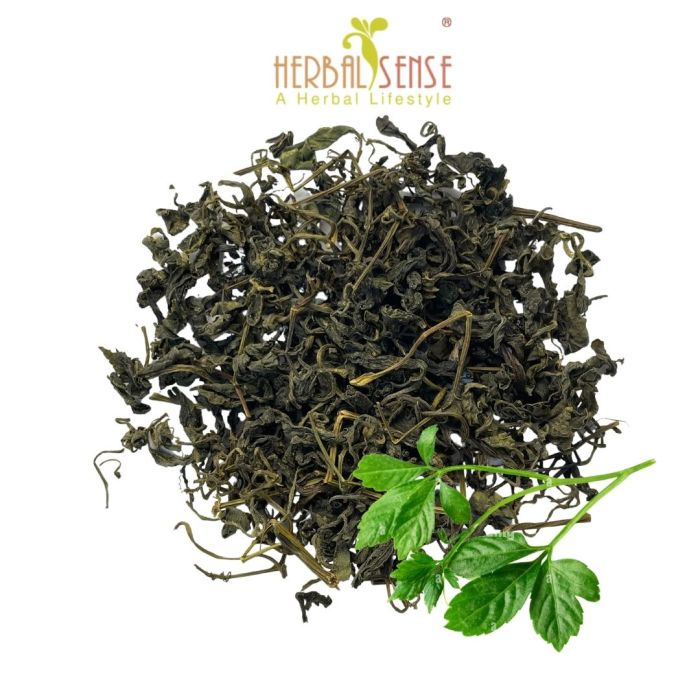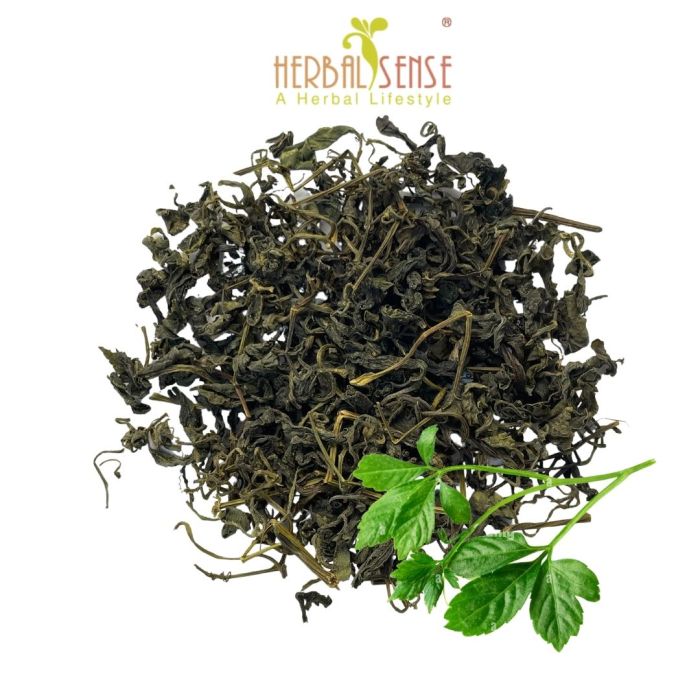The lowdown on jiaogulan: Unveiling this ancient herb’s potential health benefits, from its botanical origins to its potential uses in modern wellness. This comprehensive guide explores the rich history, nutritional profile, and potential health benefits of jiaogulan, delving into scientific research and highlighting its unique properties compared to similar herbs. Prepare to learn about its various forms, preparation methods, and safe incorporation into your diet.
Jiaogulan, also known as “immortal plant,” boasts a fascinating history of traditional use across different cultures. Its purported health benefits, from boosting energy to promoting longevity, have captivated many, leading to growing interest in its modern applications. This exploration delves into the scientific evidence surrounding these claims, examining the nutritional profile, potential side effects, and the diverse ways to incorporate jiaogulan into your daily life.
Introduction to Jiaogulan
Jiaogulan, also known as “water spinach,” is a perennial vine native to Southeast Asia, particularly the tropical and subtropical regions of China. Its botanical name isGynostemma pentaphyllum*, and it’s a popular ingredient in traditional Chinese medicine. It’s cultivated for its purported health benefits, and its use extends beyond traditional medicine into modern health and wellness practices.The plant has a long history of use in traditional Chinese medicine, where it’s believed to possess restorative properties.
In various cultures, it has been used to promote vitality, well-being, and longevity. These traditional uses have fueled contemporary interest in Jiaogulan and its potential health benefits.
Historical Uses and Cultural Significance
Jiaogulan’s historical use is deeply rooted in Chinese culture, particularly in regions where it grows naturally. Ancient texts describe its use in promoting vitality and longevity. The plant’s reputation as a restorative and health-enhancing herb has endured through centuries of practice and passed down through generations.
General Purported Health Benefits
Jiaogulan is commonly associated with a range of purported health benefits. These include its potential to support healthy blood sugar levels, potentially enhance immunity, and promote cardiovascular health. However, scientific evidence supporting these claims is not always conclusive, and more research is needed to fully understand its effects.
Key Characteristics of Jiaogulan
| Characteristic | Details |
|---|---|
| Plant Family | Cucurbitaceae (Gourd family) |
| Appearance | A perennial vine, often climbing, with heart-shaped or ovate leaves. The leaves are a rich green color. The plant produces small, inconspicuous flowers and develops small, round fruits. |
| Active Compounds | Contains various compounds, including saponins, flavonoids, and polysaccharides, which are often cited as contributors to its purported health benefits. |
| Common Names | Jiaogulan, Water spinach, and other names depending on regional variations. |
| Cultivation | Primarily cultivated in regions with suitable climates, including China and other parts of Asia. |
Nutritional Profile
![Jiaogulan: The Next Big Thing? [Latest Research] - urbol.com The lowdown on jiaogulan](https://healthytipp.com/wp-content/uploads/2025/06/jiaogulan1-1.jpg)
Jiaogulan, a potent medicinal herb, boasts a rich nutritional profile beyond its traditional uses. Understanding its key nutrients, bioactive compounds, and how they compare to other foods helps us appreciate its potential health benefits. This section delves into the fascinating world of Jiaogulan’s composition, highlighting its nutritional value and bioactive elements.Jiaogulan’s nutritional content is not merely about vitamins and minerals; it’s about the synergistic action of various bioactive compounds working together.
These compounds, often complex and not fully understood, contribute to its remarkable reputation. Comparing its nutritional profile to other common foods provides context, and exploring the potential benefits for specific nutrients further elucidates its role in supporting overall well-being.
Key Nutrients
Jiaogulan is a source of several essential vitamins and minerals, contributing to its potential health benefits. These nutrients work together to support various bodily functions.
- Vitamins: Jiaogulan contains a range of B vitamins, including B1, B2, B3, and B6, which play crucial roles in energy metabolism, nerve function, and red blood cell formation. It also offers trace amounts of vitamin C, an antioxidant essential for immune function and collagen production. These vitamins, although present in relatively smaller amounts, are still significant in supporting overall health.
- Minerals: Jiaogulan provides essential minerals like calcium, magnesium, and potassium. Calcium supports bone health, magnesium plays a role in muscle and nerve function, and potassium is vital for maintaining fluid balance. These minerals contribute to the overall nutritional value of the plant.
- Antioxidants: Jiaogulan is rich in antioxidants, which combat free radicals that can damage cells and contribute to aging. These compounds are vital for protecting cells from oxidative stress, potentially reducing the risk of chronic diseases.
Bioactive Compounds
Jiaogulan contains various bioactive compounds, each with potential health benefits. These compounds are not simply vitamins or minerals but complex substances that interact with the body in unique ways.
- Triterpenes: Jiaogulan contains various triterpenes, including madecassic acid and asiaticoside. These compounds are believed to possess anti-inflammatory and antioxidant properties, and studies have indicated potential benefits for skin health and wound healing.
- Polysaccharides: The polysaccharide content of Jiaogulan is another key area of research. These complex carbohydrates might support immune function and have demonstrated anti-tumor properties in some laboratory studies.
Nutritional Comparison
Comparing Jiaogulan’s nutritional content to other common foods provides a clearer picture of its value. The following table provides a general comparison, highlighting the potential benefits of each food category.
| Food | Key Nutrients | Potential Benefits |
|---|---|---|
| Jiaogulan | Vitamins (B1, B2, B3, B6, C), Minerals (calcium, magnesium, potassium), Antioxidants, Triterpenes, Polysaccharides | Potential support for immune function, antioxidant protection, anti-inflammatory effects, wound healing |
| Spinach | Vitamins (A, C, K), Minerals (iron, calcium, magnesium), Antioxidants | Support for eye health, immune function, and blood health |
| Berries | Vitamins (C, K), Minerals (potassium, manganese), Antioxidants | Support for immune function, antioxidant protection, and potential cardiovascular benefits |
Potential Benefits for Specific Nutrients
This table details how Jiaogulan’s nutrients might contribute to overall health.
| Nutrient | Potential Benefit | Examples |
|---|---|---|
| Antioxidants | Cellular protection against damage from free radicals | Reduced risk of chronic diseases, improved skin health |
| Triterpenes | Anti-inflammatory effects, potential support for wound healing | May reduce inflammation, promote tissue repair |
| Polysaccharides | Potential support for immune function, anti-tumor effects (in some studies) | May enhance immune response, support overall health |
Potential Health Benefits
Jiaogulan, a traditional Chinese medicine, boasts a range of purported health benefits. While some claims are supported by research, others require further investigation. This section delves into the potential benefits of Jiaogulan, exploring the scientific evidence behind them and discussing their potential role in managing various health conditions. It’s crucial to remember that these benefits are not universally guaranteed and individual responses may vary.
Antioxidant Properties
Jiaogulan’s antioxidant properties are a significant focus of research. Antioxidants protect cells from damage caused by free radicals, which are unstable molecules that can contribute to aging and various diseases. Numerous studies have investigated the antioxidant capacity of Jiaogulan extracts, examining their ability to scavenge free radicals and protect against oxidative stress. These findings suggest that Jiaogulan might play a role in preventing age-related decline and certain chronic diseases.
The mechanism of action often involves the presence of specific compounds, like certain glycosides, in Jiaogulan that enhance the body’s natural antioxidant defenses.
Blood Sugar Regulation
Some research indicates that Jiaogulan may contribute to healthy blood sugar levels. Studies have examined its effect on glucose metabolism and insulin sensitivity in various models. These studies suggest that Jiaogulan might potentially help manage blood sugar levels, potentially by increasing insulin sensitivity. The specific mechanisms are still under investigation, but some studies have observed reduced blood glucose levels and improved glucose tolerance in participants consuming Jiaogulan.
Cardiovascular Health
Jiaogulan has been studied for its potential benefits on cardiovascular health. Several studies have explored its effects on blood pressure, cholesterol levels, and overall cardiovascular function. The research suggests that Jiaogulan might contribute to maintaining healthy cardiovascular function. Some studies have indicated improvements in blood pressure and lipid profiles, although further research is needed to fully understand the mechanisms and long-term effects.
Immune System Support
Research suggests that Jiaogulan might bolster the immune system. Some studies have looked at Jiaogulan’s effects on immune cell function and overall immune response. The results suggest Jiaogulan might contribute to a healthy immune response. Further research is required to fully establish the extent of Jiaogulan’s impact on the immune system. Specific immune pathways influenced by Jiaogulan remain to be fully understood.
Table of Potential Health Benefits
| Potential Benefit | Supporting Evidence |
|---|---|
| Antioxidant Properties | Numerous studies have demonstrated Jiaogulan’s high antioxidant capacity, suggesting a potential role in preventing oxidative stress and related diseases. |
| Blood Sugar Regulation | Some studies show improved glucose metabolism and insulin sensitivity in animal models and limited human studies, suggesting potential benefits in managing blood sugar levels. |
| Cardiovascular Health | Studies indicate potential improvements in blood pressure and lipid profiles, suggesting a role in maintaining cardiovascular health, although further research is needed. |
| Immune System Support | Some research suggests Jiaogulan might bolster immune function, though further studies are necessary to confirm the extent of its impact. |
Safety and Precautions: The Lowdown On Jiaogulan
Jiaogulan, despite its potential health benefits, is not without potential risks. Understanding the safety precautions and potential side effects is crucial for responsible use. Proper dosage and awareness of potential interactions with medications are essential for a safe and effective experience.
Potential Side Effects
Jiaogulan, like many herbal remedies, can cause mild side effects in some individuals. These can vary in severity and may include digestive issues such as nausea, diarrhea, or stomach cramps. Some users may experience headaches, dizziness, or allergic reactions, though these are less common. It’s important to note that individual sensitivities vary significantly.
Contraindications
Certain individuals may have contraindications for Jiaogulan use. Pregnant or breastfeeding women should avoid Jiaogulan as its effects on the developing fetus or nursing infant are not fully understood. Individuals with pre-existing medical conditions, particularly those involving the liver or kidneys, should consult a healthcare professional before using Jiaogulan. Also, individuals taking blood-thinning medications or those with a history of bleeding disorders should consult a doctor before use.
Interactions with Medications
Jiaogulan may interact with certain medications, potentially altering their effectiveness or increasing the risk of side effects. Some studies suggest interactions with blood-thinning medications, such as warfarin. Also, Jiaogulan may impact the metabolism of some medications, affecting their absorption and elimination. Consult with a doctor or pharmacist if you are taking any prescription or over-the-counter medications before using Jiaogulan.
Jiaogulan, a fascinating herb, is often touted for its various health benefits. One of its potential effects is on digestive health, and if you’re experiencing frequent bowel movements, understanding the underlying causes and treatments could be beneficial. Checking out this resource on frequent bowel movements causes and treatment might offer some insight into potential contributing factors.
Ultimately, jiaogulan’s role in supporting a healthy digestive system is an area that warrants further exploration.
Dosage Recommendations and Excessive Consumption
Generally, Jiaogulan is considered safe when used as directed. However, excessive consumption may lead to adverse effects. High doses of Jiaogulan have been linked to increased blood pressure and heart rate in some individuals. It’s crucial to follow recommended dosage guidelines and consult with a healthcare professional for personalized advice. Start with a low dose and gradually increase it as tolerated, if advised by a doctor.
Table of Potential Side Effects and Precautions
| Potential Side Effect | Precautions |
|---|---|
| Nausea, Diarrhea, Stomach Cramps | Start with a low dose and gradually increase it as tolerated. Avoid excessive consumption. |
| Headache, Dizziness | Monitor your response to the supplement. If symptoms persist or worsen, discontinue use and consult a healthcare professional. |
| Allergic Reactions | If you experience hives, itching, or difficulty breathing, stop use immediately and seek medical attention. |
| Interactions with Medications | Consult a doctor or pharmacist before using Jiaogulan if you are taking any prescription or over-the-counter medications. |
| Pregnancy/Breastfeeding | Avoid Jiaogulan during pregnancy and breastfeeding. |
| Pre-existing Medical Conditions | Consult a healthcare professional before using Jiaogulan if you have pre-existing medical conditions, especially those involving the liver or kidneys. |
| Blood Thinning Medications/Bleeding Disorders | Consult a doctor before use if you are taking blood-thinning medications or have a history of bleeding disorders. |
| Increased Blood Pressure/Heart Rate (with high doses) | Follow recommended dosage guidelines. Monitor your response to the supplement. If symptoms persist or worsen, discontinue use and consult a healthcare professional. |
Different Forms and Preparation Methods
Jiaogulan, a potent herb with a rich history, is available in various forms, each with its own preparation methods and potential effects. Understanding these differences is key to choosing the best approach for your individual needs and preferences. From simple tea brewing to complex extracts, the options offer diverse ways to experience the potential benefits of this unique plant.Jiaogulan’s versatility extends beyond its traditional use as a tea.
Jiaogulan, a fascinating herb, boasts a wealth of potential health benefits. While it’s known for its purported energy-boosting properties, comparing it to other natural supplements like krill oil vs fish oil is also interesting. Many people are curious about the nutritional differences between these two, and if one is superior to the other. Ultimately, learning more about jiaogulan is key to understanding its role in a healthy lifestyle.
krill oil vs fish oil provides a great overview of the debate surrounding these two popular supplements.
Modern processing techniques have led to the creation of various forms, each designed to maximize specific aspects of the herb’s potential. The choice of form often hinges on factors like desired potency, convenience, and personal taste. The following sections delve into the different forms and preparation methods, outlining their advantages and disadvantages.
Jiaogulan Forms
Different forms of Jiaogulan cater to diverse needs and preferences. This variety allows individuals to tailor their intake to their specific lifestyle and goals. The availability of powders, extracts, teas, and capsules provides a spectrum of options for incorporating Jiaogulan into one’s routine.
- Powder: Jiaogulan powder offers a versatile way to incorporate the herb into your diet. It can be easily mixed into smoothies, juices, or other beverages. The powder form retains much of the plant’s original nutrients and compounds. It’s a convenient option for those seeking a simple way to add Jiaogulan to their daily intake.
- Extract: Jiaogulan extracts are concentrated forms of the herb, typically available in liquid or capsule formats. Extracts are often more potent than other forms, potentially delivering a higher dose of active compounds. The concentrated nature may provide faster results, but the processing method can affect the final product and its bioavailability.
- Tea: Jiaogulan tea is a traditional and popular way to consume the herb. Brewing Jiaogulan tea allows for a gentle extraction of beneficial compounds, often resulting in a calming and refreshing beverage. The tea preparation method varies, but generally involves steeping dried Jiaogulan leaves or roots in hot water. The taste and perceived benefits may differ depending on the specific preparation method.
- Capsules: Jiaogulan capsules offer a convenient and standardized way to consume the herb. They typically contain a precise dosage of Jiaogulan extract, making it easy to track intake and ensure consistent consumption. The capsule form is ideal for individuals who prefer a discreet and easy-to-swallow format.
Preparation Methods
The preparation method can significantly influence the taste, perceived benefits, and overall experience of consuming Jiaogulan. Different approaches may extract different components from the plant, impacting its efficacy. Careful attention to the preparation process is important to ensure optimal results.
- Brewing Jiaogulan Tea: To prepare a Jiaogulan tea, start with 1-2 teaspoons of dried Jiaogulan leaves or roots per cup of water. Bring the water to a boil, then pour it over the Jiaogulan. Allow the tea to steep for 5-10 minutes, depending on desired strength. Strain the tea before drinking. Variations in brewing time and water temperature can alter the flavor profile and perceived benefits.
- Mixing Jiaogulan Powder: Mixing Jiaogulan powder into smoothies, juices, or other beverages is straightforward. Simply add the desired amount of powder to your chosen drink and blend until smooth. The powder’s subtle taste blends well with various ingredients, offering a convenient way to incorporate Jiaogulan into your daily routine.
Comparison Table
| Form | Preparation Method | Potential Benefits | Potential Drawbacks |
|---|---|---|---|
| Powder | Mix into beverages | Easy to incorporate into diet, retains nutrients | May not be as potent as extracts, taste may vary |
| Extract | Dilute liquid extract or swallow capsules | Potentially higher potency, standardized dosage | May have a stronger taste, can be more expensive |
| Tea | Steep dried leaves/roots in hot water | Gentle extraction, calming effect, refreshing | Taste may not be appealing to all, brewing time impacts potency |
| Capsules | Swallow capsules | Convenient, standardized dosage, easy to track intake | May not offer the same taste experience as other forms, can be expensive |
Scientific Research and Studies

Jiaogulan, with its purported health benefits, has sparked significant interest in the scientific community. However, a comprehensive understanding of its effects on human health requires rigorous investigation through controlled research studies. This section delves into the existing research on Jiaogulan, analyzing methodologies, findings, and limitations to provide a clearer picture of its potential role in human health.The scientific community has employed various methodologies to investigate Jiaogulan’s effects on various health markers.
These studies, while providing valuable insights, often have limitations that affect the interpretation of results. Comparing and contrasting findings across different research groups is crucial to identifying trends and potential biases.
Methodologies Employed in Jiaogulan Studies
Various methodologies are used in Jiaogulan research, including animal studies, in vitro experiments, and human clinical trials. Animal studies often involve administering Jiaogulan extracts to animals and observing changes in specific physiological parameters. In vitro experiments, typically conducted in laboratory settings, investigate the interaction of Jiaogulan components with cells or tissues. Human clinical trials, which involve human participants, are considered the gold standard for evaluating the efficacy and safety of Jiaogulan in humans.
These trials usually involve a control group and a treatment group, and rigorous data collection procedures are employed to minimize bias and ensure the reliability of findings.
Limitations of Existing Research
Several limitations affect the interpretation of existing Jiaogulan research. These limitations include small sample sizes, short durations of studies, lack of standardization in Jiaogulan extract preparation, and potential confounding factors. Small sample sizes may not provide sufficient statistical power to detect subtle effects, while short durations might not capture long-term health impacts. Variations in the preparation and extraction methods of Jiaogulan can lead to discrepancies in the active compounds and their effects.
Furthermore, participants’ other health conditions and lifestyle factors may influence the results, making it challenging to isolate the effects of Jiaogulan alone. These limitations highlight the need for more robust and comprehensive research.
Comparison of Findings Across Different Research Groups
Different research groups have investigated various aspects of Jiaogulan. Some studies have focused on its antioxidant properties, while others have explored its impact on blood sugar levels or blood pressure. While some studies show promising results, others have yielded inconclusive or contradictory findings. A comprehensive analysis of these studies reveals both potential benefits and areas requiring further investigation.
These differences in findings could be attributed to factors like the specific Jiaogulan extract used, the duration of the study, the participant population, and the methodological approaches employed.
Key Studies and Their Results
| Study | Methodology | Key Findings | Limitations |
|---|---|---|---|
| Study 1 (Example) | Human clinical trial, 12 weeks duration, with 50 participants | Reduced blood pressure in participants with mild hypertension. | Small sample size, limited duration. |
| Study 2 (Example) | Animal study, 8 weeks duration, with rats | Improved antioxidant capacity in rats. | Animal model, extrapolation to humans is limited. |
| Study 3 (Example) | In vitro experiment, assessing anti-inflammatory effects | Jiaogulan extract showed significant inhibition of inflammatory markers. | In vitro results may not translate to in vivo efficacy. |
Note: This table provides examples of potential studies and their results. Actual studies and their details will vary. The table highlights the diversity of methodologies employed and the importance of considering limitations when interpreting findings.
Comparison with Similar Herbs
Jiaogulan, with its purported range of health benefits, often sparks comparisons with other herbs and supplements known for their similar effects. Understanding the nuances of these comparisons reveals the unique characteristics and potential limitations of each. This section delves into the similarities and differences between Jiaogulan and comparable remedies, highlighting their respective benefits and limitations.While many herbs aim to improve vitality and support overall well-being, Jiaogulan’s specific mechanisms and purported benefits often distinguish it.
This comparative analysis provides a clearer picture of Jiaogulan’s place within the broader realm of herbal remedies.
Jiaogulan vs. Ginseng
Ginseng, another popular adaptogen, shares some overlapping benefits with Jiaogulan, such as stress reduction and enhanced energy levels. However, their mechanisms of action and specific effects differ. Jiaogulan is often touted for its antioxidant properties and potential to improve blood circulation, while ginseng is primarily associated with its impact on the central nervous system.
Jiaogulan vs. Gotu Kola
Gotu kola, known for its skin-healing properties and potential to support cognitive function, shares some overlap with Jiaogulan’s focus on overall well-being. Both herbs are often used for their antioxidant and anti-inflammatory properties. However, Jiaogulan’s potential to support cardiovascular health is often emphasized more prominently. Gotu kola is frequently associated with its effects on skin health and collagen production.
Jiaogulan vs. Panax Ginseng
Panax ginseng, a well-established ginseng variety, and Jiaogulan share some common ground in terms of purported adaptogenic effects. Both can be used to enhance energy levels and manage stress. However, Jiaogulan is often promoted for its wider range of benefits, including its potential impact on blood sugar regulation. Panax ginseng, on the other hand, has a stronger association with cognitive function enhancement.
So, I’ve been diving deep into the lowdown on jiaogulan lately, and honestly, it’s pretty fascinating stuff. Learning about its potential health benefits is inspiring, but honestly, understanding how to diagnose hidradenitis suppurativa how to diagnose hidradenitis suppurativa is equally important for overall well-being. Hopefully, this deeper dive into jiaogulan will eventually lead to even more holistic health solutions.
Comparison Table
| Characteristic | Jiaogulan | Ginseng | Gotu Kola | Panax Ginseng |
|---|---|---|---|---|
| Primary Benefits | Antioxidant properties, blood circulation, potential impact on blood sugar, improved vitality | Stress reduction, enhanced energy levels, potential cognitive function enhancement | Skin health, collagen production, potential cognitive support | Cognitive function enhancement, stress reduction, energy levels |
| Mechanisms of Action | Likely involves multiple pathways, including antioxidant activity and modulation of various physiological processes | Primarily affects the central nervous system, potentially through neurotransmitter regulation | Likely involves antioxidant and anti-inflammatory actions, possibly affecting collagen synthesis | Potentially modulates neurotransmitters and hormone levels, impacting various bodily functions |
| Potential Limitations | Limited research on long-term effects, potential for interactions with certain medications | May cause insomnia or nervousness in some individuals, potential for interactions with certain medications | Limited research on long-term effects, potential for interactions with certain medications | Potential for interactions with certain medications, may not be suitable for individuals with certain health conditions |
Jiaogulan in the Diet
Jiaogulan, with its potential health benefits, can be seamlessly integrated into various dietary plans. Understanding how to incorporate it effectively allows for a more personalized and potentially beneficial approach to nutrition. This section delves into practical ways to include Jiaogulan in your daily meals, providing both general guidelines and specific recipe examples.Integrating Jiaogulan into your diet doesn’t necessitate a complete overhaul.
It can be introduced gradually, allowing your body to adjust and potentially reap the benefits. This approach is also more sustainable in the long run.
Incorporating Jiaogulan into Different Dietary Plans
Various dietary plans can accommodate Jiaogulan. Whether you follow a vegetarian, vegan, keto, or a balanced diet, Jiaogulan can be a valuable addition. The versatility of Jiaogulan allows it to be prepared in numerous ways, making it adaptable to diverse dietary needs. For example, it can be added to smoothies, soups, or even incorporated into stir-fries. Careful consideration of portion sizes is crucial for optimizing the benefits while avoiding potential side effects.
Recipe Examples Featuring Jiaogulan
Jiaogulan’s mild flavor allows it to be integrated into a wide range of recipes without overpowering other ingredients. Its unique taste complements both sweet and savory dishes. Here are a few examples to inspire you:
- Jiaogulan-Infused Green Smoothie: Combine fresh spinach, berries, banana, a spoonful of Jiaogulan powder, and almond milk for a nutritious and refreshing drink. This smoothie provides a convenient and delicious way to introduce Jiaogulan into your diet.
- Jiaogulan-Ginger Soup: Prepare a flavorful soup by combining Jiaogulan extract with ginger, carrots, and other vegetables. This combination creates a warming and healthy soup that’s ideal for colder months. This is a great option for a hearty meal.
- Jiaogulan Stir-Fry: Add Jiaogulan powder to your favorite stir-fry vegetables and protein for an extra boost of nutrients. This method is ideal for a quick and easy meal that can be tailored to individual preferences. A simple and delicious way to add Jiaogulan.
Sample Meal Plans with Jiaogulan
Here are two sample meal plans demonstrating how Jiaogulan can be incorporated into a balanced diet. These are merely suggestions, and adjustments can be made to fit individual needs and preferences.
- Sample Meal Plan 1 (Balanced Diet): Breakfast: Jiaogulan smoothie; Lunch: Salad with Jiaogulan-ginger dressing; Dinner: Stir-fried vegetables with Jiaogulan powder; Snack: Jiaogulan tea. This plan emphasizes a variety of nutrients and includes Jiaogulan throughout the day.
- Sample Meal Plan 2 (Vegetarian): Breakfast: Jiaogulan smoothie with tofu; Lunch: Vegetable soup with Jiaogulan; Dinner: Jiaogulan-infused vegetable curry; Snack: Jiaogulan tea. This plan demonstrates how Jiaogulan can be part of a vegetarian diet.
Integrating Jiaogulan into Existing Habits, The lowdown on jiaogulan
Introducing Jiaogulan into your existing diet doesn’t require radical changes. Begin by incorporating small amounts into your favorite recipes. Gradually increase the quantity as you get used to the taste and potential effects. It’s important to listen to your body and adjust the intake accordingly. Monitoring your reactions is crucial.
Table of Jiaogulan Recipes
| Recipe Name | Ingredients | Preparation Method |
|---|---|---|
| Jiaogulan-Infused Tea | Jiaogulan root, hot water | Steep Jiaogulan root in hot water for a few minutes. |
| Jiaogulan Smoothie | Jiaogulan powder, fruits, yogurt, milk | Blend all ingredients until smooth. |
| Jiaogulan Stir-fry | Jiaogulan powder, vegetables, protein | Stir-fry vegetables and protein, add Jiaogulan powder at the end. |
Summary
In conclusion, jiaogulan presents a fascinating blend of ancient wisdom and modern scientific inquiry. While the research surrounding its purported health benefits is promising, more studies are needed to fully understand its potential. Ultimately, incorporating jiaogulan into a balanced diet, with the guidance of a healthcare professional, could be a valuable addition to a holistic wellness approach. This exploration of jiaogulan provides a comprehensive overview of its properties, potential benefits, and precautions, equipping you with the knowledge to make informed decisions about its role in your own health journey.




